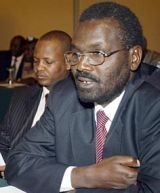Darfur rebel JEM ready for ceasefire if Sudan commits to peace
Feb 21, 2007 (ABECHE) — The head of one Darfur’s main rebel groups said he is willing to call a ceasefire if the Khartoum government stops attacks on civilians in the war-torn region and agrees to re-negotiate the Darfur peace deal, but warned of all-out war if it fails to do so.
 The United Nations is trying to get the government and rebels into negotiations, hoping to rework the Darfur Peace Accord, which Khalil Ibrahim’s Justice and Equality Movement and most other rebel groups have refused to join.
The United Nations is trying to get the government and rebels into negotiations, hoping to rework the Darfur Peace Accord, which Khalil Ibrahim’s Justice and Equality Movement and most other rebel groups have refused to join.
Since the accord was signed in May, violence has only increased in the western region of Sudan, with fighting between government and rebels and continued attacks by the pro-government Arab janjaweed militia, which is accused of widespread atrocities against Darfur civilians.
The United Nations warned this week that a large number of militiamen — apparently janjaweed — were massing near El-Geneina, the capital of West Darfur, raising fears of more violence. U.N. spokeswoman Radhia Achouri said the reason for the gathering was not known and would not say how many militiamen were there. The West Darfur governor denied the report.
“If Khartoum doesn’t reopen peace negotiations and doesn’t immediately cease janjaweed attacks, we will have no choice but large-scale offensive,” Ibrahim said in an interview with the Associated Press.
“We will agree to an immediate ceasefire if there is a framework for new peace talks. We are waiting for the government’s response,” Ibrahim said. “Either we get the opportunity to negotiate a real treaty, an acceptable peace that we can sell to our people, or we will proceed.”
Ibrahim, whose JEM leads a coalition of rebel groups, spoke outside the town of Abeche in eastern Chad, close to the border with Sudan and Darfur. Around 40 of his fighters were with him, sitting in the shade of trees in a dried-up riverbed.
Ibrahim made clear his forces were ready to keep fighting. He dismissed reports that Sudan was using a flood of new oil income to build up its armed forces, saying the rebels capture many government weapons.
“This is all provided by the Sudanese government,” he said, pointing to five pickup trucks that looked like the ones used by the Sudanese army, laden with rocket-propelled grenades and heavy machine guns.
Ibrahim spoke after coming out of a meeting with a senior Chadian general. Sudan accuses Chad of backing the Darfur rebels. Ibrahim insisted JEM — whose leadership is a mix of former Islamists and former communists — gets no foreign support, but acknowledged that Chad gave free passage to his men.
“Our men our fighting for a cause, for our land and for our people,” he said. “Every time the (Sudanese) army comes out in the open, we defeat them.”
He would not specify how many troops he has but dismissed estimates that his trained fighters number only in the hundreds. He cited a major battle last September in northern Darfur where rebels crushed a 4,000-strong government force, capturing over 100 vehicles, heavy armament and a Sudanese army general along with hundreds of soldiers. He also said his troop downed two army helicopters in December during a raid against the Abu Jabra oil fields in Kordofan, halfway between Darfur and Khartoum.
More than 200,000 people have been killed in Darfur in three years of fighting between the government and ethnic African rebels. The government is accused of unleashing the janjaweed, who are blamed for widespread rapes and atrocities against ethnic African civilians. More than 2.5 million people have fled their homes, and the conflict has begun to spill over into neighboring Chad.
The May peace deal, negotiated in the Nigerian town of Abuja, was rejected by most Darfur refugees and rebels, who said it gave no guarantees the government would stop fighting, did not provide compensation and did not directly provide for a U.N. peacekeeping force for Darfur.
Only one rebel leader, Minni Minawi of the Sudan Liberation Army accepted. He has since received a top government post but has lost much support in Darfur, and some of his fighters have split to continue fighting.
Envoys from the U.N. and African Union met with the government and rebels in Sudan last week, trying to broker a reduction in violence and an agreement to re-open talks. AU envoy Salim Ahmed Salim said there was “readiness” by all to improve the Darfur peace deal, but there was no word on talks.
Ibrahim said he felt cheated by the May deal, which he said was imposed by American and European envoys, who “wanted to tell their people they’d solved the problem in Darfur, when in fact they only made it worse.”
Ibrahim urged the U.N. to send peacekeepers to Darfur despite Sudan’s rejection of a plan to send some 22,000 U.N. troops to replace the overwhelmed AU force in Darfur.
(AP)
